|
The Greatest Tearjerkers of All-Time
|
|
Title Screen
|
Movie Title/Year and Brief Tearjerker Scene Description
|
Screenshots
|

|
Cinema Paradiso (1988, It./Fr.)
 #48 #48
 #58
#58
- the scene of teenaged projectionist Salvatore
(nicknamed Toto) (Marco Leonardi as teenager) of the local Cinema
Paradiso movie theatre being advised when leaving the small
Sicilian town of Giancaldo at the train station bound for Rome, to
never return or look back, by his loving, blinded mentor/surrogate
father Alfredo (Philippe Noiret): ("Don't come back. Don't
think about us. Don't look back. Don't write. Don't give in to nostalgia.
Forget us all. If you do and you come back, don't come see me. I
won't let you in my house. Understand?"). Toto then thanked
Alfredo: "Thank
you. For everything you've done for me." Alfredo's last words
were: "Whatever you end up doing, love it. The way you loved
the projection booth when you were a little squirt."
- also, the
touching moment when middle-aged, world-famous Italian film director
Salvatore Di Vita (Jacques Perrin as adult) returned to his peasant
childhood Sicilian hometown of Giancaldo after 30 years to attend
the funeral of Alfredo, whom he succeeded as the town's movie theatre
projectionist after a devastating fire blinded him. He was given
a gift of a reel of film by Alfredo's widow. When he returned to
Rome, he projected the reel, watching the long montage of romantic
("pornographic") amorous screen kisses ordered spliced
out of numerous films by the village priest Father Adelfio (Leopoldo
Trieste) when he was a boy

|

|
|
Spliced Together Censored Kisses
|
See "The Censored Kisses and Scenes of Cinema Paradiso (1988): The Kissing Montage" (i.e., His
Girl Friday, The Gold Rush, The Outlaw, The Son
of the Sheik, The Adventures of Robin Hood, etc.)
|
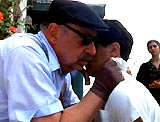
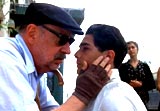
Teenaged Salvatore's Goodbye to Alfredo

Adult-Aged Salvatore Watching the Film Reel
|
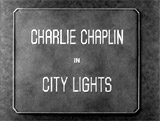
|
City Lights (1931)
- one of the greatest endings in cinema
history, in which the now-wealthy Flower Girl (Virginia Cherrill) encountered
the vagrant Little Tramp (Charlie Chaplin) in an accidental meeting for
the first time since the Tramp selflessly sacrificed his own money to restore
her sight -- when the Flower Girl recognized him, the Tramp's face showed
a bevy of mixed emotions: shame, fear, bravery, pain, tentativeness, love,
bliss and joy. At first, she appeared slightly dismayed and confused - he
looked so completely different from what she expected - and then she was
moved. The Tramp smiled and his eyes lit up when she recognized and
accepted him for who he was
|
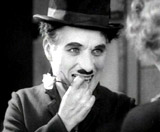
The Tramp Touched by the Flower Girl
|

|
Close Encounters
of the Third Kind (1977)
- the finale in which the doors
opened and humans who had been missing emerged - and young Barry
(Cary Guffey) was reunited with his mother Jillian (Melinda Dillon)
- the choosing of Roy Neary (Richard Dreyfuss) - 'adopted'
and taken into the 'mother-ship' alien craft; the
final shot of Roy ascending into the wondrous, ethereal heart of the
mothership
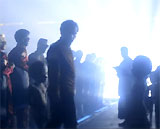
|
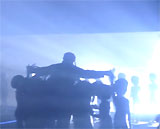
|
|
Roy's Ascent into the Mothership with Aliens
|
- one of the aliens communicating
'farewell' with hand signals to UN scientist Claude Lacombe (Francois
Truffaut) before the Mother Ship ascended and departed, as
John Williams' score soared in triumph - incorporating "When
You Wish Upon a Star" from Pinocchio (1940)
|

Young Barry Reunited with His Mother

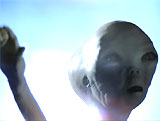
Hand-Signal Goodbye

Mother Ship's Departure
|

|
Cocoon (1985)
 #29
#29
- the sad scene of the reckless behavior
of retirement home residents who unwittingly drained the life-giving
qualities of the nearby magical swimming pool - and caused the death
of one of the ancient Antarean aliens (one of the ground crew) in
one of the cocoon pods; the Antarean leader Walter (Brian Dennehy)
announced: "Now the life force is completely drained from the water";
he basically admitted that his mission from Antarea to Earth to save
the twenty cocoon pods and return them to his home planet had failed:
"I'm not gonna be able to bring them back"
- the heart-breaking scene of the death of
Rose (Herta Ware) due to dementia and respiratory failure, discovered
suddenly dead in her bed by husband Bernie Lefkowitz (Jack Gilford)
- after which he carried her in his arms over to the non-functioning
life-giving pool near the Florida retirement community and tried
to revive her, completely stricken with guilt over earlier forbidding
his wife to sample the pool's power out of fear and timidness; he
asked Walter: "Can you help me?
I have to do something for her. She - she's..." and was coldly
told:
"The pool doesn't work anymore, it's too late." Bernie
vainly offered:
"I'll give you everything I've got." Walter: "I'm
sorry, Bernie, I wish I could help you, it's just too late." He
sobbed over her:
"Rosie, oh, Rosie!"
- the poignant scene of Ben Luckett (Wilford Brimley)
telling his grandson David (Barret Oliver) goodbye - while standing
in knee-deep water fishing - and what he would miss on Earth (grandsons,
fishing holes, hotdogs, baseball games, etc.) by going away forever
to another planet - but also the benefits: ("When we get where we're going, we'll
never be sick, we won't get any older, and we won't ever die")

|
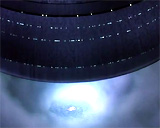
|
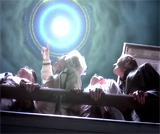
|
|
Descent of Spaceship to Pick Up Seniors - Raising
Up The Entire Charter Boat Into an Alien Spacecraft
|

|
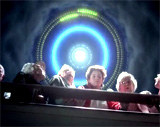
|
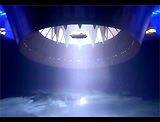
|
|
Boat-Load Departure of Seniors Transported
to Spaceship
|
- and
the finale in which the boat-load of seniors were transported upwards
into a departing Antarean spaceship for the unknown planet and immortality
|
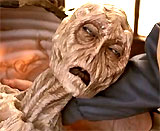
Death of One of the Aliens Due to the Drained Lifeforce
in the Pool

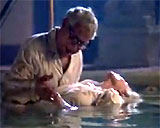
Death of Rose and Bernie's Vain Attempt to Revive Her
in Pool
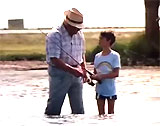
Goodbye Scene: Ben with Grandson David
|
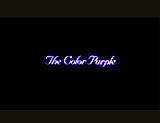
|
The Color Purple (1985)
 #48 #48
- the scene in which two sisters were separated:
young Celie (Desreta Jackson) and her teenaged sister Nettie (Akosua
Busia) - when Nettie was forcibly thrown off the farm by Celie's
brutish husband "Mister" Albert (Danny Glover) after Nettie had
painfully rebuffed Albert's sexual advances during an attempted
rape - Nettie cried out asking:
"Why? Why? Whhhhhyyyy?"; Celie urged: "WRITE!", and Nettie
responded: "Nothing but death can keep me from her!"
- the emotional scene in which
juke joint singer Shug Avery (Margeret Avery), Albert's old sweetheart,
sang "Maybe
God Is Tryin' To Tell You Somethin'": ("Speak to me! Speak
to me!")
to her estranged preacher father Rev. Samuel (Carl Anderson) who
hadn't uttered a word to her in decades; she shed tears of absolute
happiness when he returned her hug as she whispered in his ear: ("See,
Daddy? Sinners have soul too")
- the joyous reunion of a middle-aged
Celie (Whoopi Goldberg as adult) with Nettie (who had emigrated back
from Africa), beginning with Celie happily calling out "NETTIE!" -
and followed by the kisses the sisters gave each other, barely
daring to believe the other was real; and Celie's first introduction
and heart-rending reuniting with her two adult children (a son
and daughter); very improbably, Nettie had gone to Africa with
a missionary and his wife who had adopted Celie's two children
|

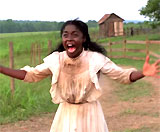
Separation of Two Sisters: Celie and Nettie
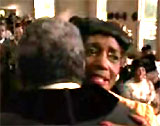
Shug with her Father
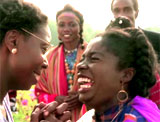
Reunion of Nettie and Celie
|
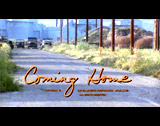
|
Coming Home (1978)
- the stark, violent breakup scene between housewife
Sally Hyde (Jane Fonda) and her returning husband-vet Bob (Bruce
Dern) (Sally: "It happened. I needed somebody. I was lonely..." Bob: "Bulls--t...if
it's over with us, it's over...What I'm saying ISSSS I do not belong
in this house. And they're saying that I don't belong over there")
- wheelchair-bound Vietnam vet Luke Martin's (Jon
Voight) impassioned speech to high school students about the futility
of war: ("...And
now I'm here to tell ya that I have killed for my country, or whatever.
And I don't feel good about it. Because there's not enough reason,
man, to feel a person die in your hands or to see your best buddy
get blown away. I'm here to tell ya it's a lousy thing, man. I
don't see any reason for it. And there's a lot of s--t that I did
over there that I find f--king hard to live with. And I don't want
to see people like you, man, comin' back and having to face the
rest of your lives with that kind of s--t. It's as simple as that.
I don't feel sorry for myself. I'm a lot f--kin' smarter now than
when I went. And I'm just tellin' ya, there's a choice to be
made here")
|
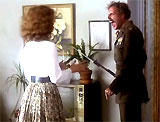
Break-Up Scene

Luke: "There's a choice to be made here"
|
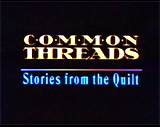
(from trailer)
|
Common Threads: Stories From
the Quilt (1989)
- the six compelling, emotional stories told by the friends
and families of AIDS victims (four gay men -- including film historian
and AIDS activist/storyteller Vito Russo --a straight man and a hemophiliac
boy) and the making of their personal quilts, accompanied by the
news broadcasts following the development of AIDS from its euphemistic
origin as GRID (gay-related immuno-deficiency disease) in 1980
-
the famous speech by 36 year-old victim Roger Gail Lyon: ("This
is not a political issue. This is a health issue. This is not a gay
issue. This is a human issue. And I do not intend to be defeated
by it. I came here today in the hope that my epitaph would not read
that I died of red tape")
- the unfolding of the giant AIDS
Memorial Quilt in Washington, DC composed of thousands of quilts,
each a separate, personalized tribute to an individual AIDS victim
-- all accompanied by jazz musician Bobby McFerrin's affecting a
capella lullaby "Common Threads"
|
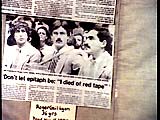
"Don't let epitaph be: 'I died of red tape'"
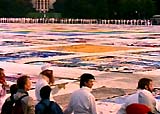
Quilt's Unfolding in Washington DC
|

|
Contact (1997)
- the heartwarming, poignant scene when agnostic scientist
Ellie Arroway (Jodie Foster) saw her long-dead father Ted (David
Morse) when she arrived on a beach on the planet Vega - after her
mystical journey, he told her as a proxy for the alien beings: ("You're
an interesting species, an interesting mix. You're capable of such
beautiful dreams and such horrible nightmares. You feel so lost,
so cut off, so alone, only you're not. See, in all our searching,
the only thing we've found that makes the emptiness bearable...is
each other")
- the finale of Ellie's testimony
about her quasi-religious experience: (" I... had
an experience. I can't prove it, I can't even explain it, but everything
that I know as a human being, everything that I am tells me that
it was real. I was given something wonderful, something that changed
me forever. A vision of the universe..."); afterwards, she
was greeted by thousands of supporters outside the court with
signs saying
"We Believe You", etc.
|
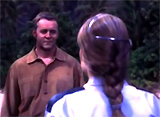
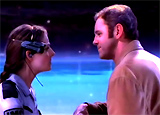
Ellie with Father
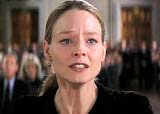
Ellie's Testimony
|

|
Crouching Tiger, Hidden Dragon
(2000, HK/US)
- the tearjerking death of heroic
warrior and martial arts master Li Mu Bai (Chow Yun-Fat), who was
poisoned by arch-villain Jade Fox (Cheng Pei-pei) with the Purple
Yin, and his final, long overdue declaration of his love for fellow
warrior Yu Shu Lien (Michelle Yeoh) with his dying breath: ("I've
already wasted my whole life. I want to tell you with my last breath
that I have always loved you"), followed by small, passionate
kisses
- Li Mu Bai's final romantic farewell to Yu Shu Lien:
("I
would rather be a ghost drifting by your side as a condemned soul
than enter heaven without you. Because of your love, I will never
be a lonely spirit")
|




Death of Li Mu Bai - in Yu Shu Lien's Arms
|
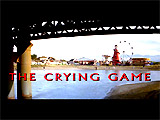
|
The Crying Game (1992, UK)
- the tearful and vengeful "interrogation" scene
between a gun-toting Dil (Jaye Davidson) and IRA volunteer soldier
Fergus (Stephen Rea), whom Dil had tied to his bed after finding
out he had been complicit in the accidental death of his ex-lover
- British soldier Jody (Forest Whitaker), as the song "The Crying
Game" played on Dil's tape deck. Fergus told Dil that he loved
him, would do anything for him and would never leave him - with Dil
responding, as he laid his head on Fergus' chest/shoulder: ("I
know you're lying, but it's nice to hear it")
- in the following scene, after
Dil had killed IRA assassin/femme
fatale Jude (Miranda Richardson) in his apartment, he turned
the gun on Fergus, but admitted: ("I can't do it, Jimmy. He
(Jody) won't let me"). Fergus reassuringly took the gun away
when Dil put the gun in his mouth to commit suicide, and asked
him with deep love and caring to run away - promising Dil he would
see him again.
- after Dil fled, the police arrived on the street
below - so Fergus took the gun, wiped Dil's fingerprints from it,
and told Jody's smiling picture: "You should have stayed at
home." He then sat down
as he waited for the police to arrest him in Dil's place
|
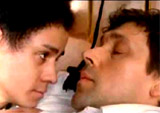 Dill
with Fergus Dill
with Fergus
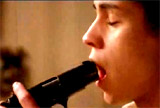
Dil Threatening to Commit Suicide
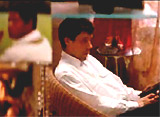
Fergus Waiting For Police's Arrest
|
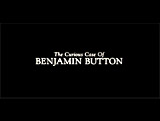
|
The Curious Case of Benjamin
Button (2008)
- the tearjerking, strained relationship ("under
unusual circumstances"), in David Fincher's sweeping but overwrought
historic recreation, between young childhood sweetheart
and later youthful Broadway dancer Daisy (Cate Blanchett, or as younger
Elle Fanning/Madisen Beaty) and reverse-aging miracle-baby Benjamin
Button (Brad Pitt), when for a brief moment their lives intersected
when they were both in their 40s
- Button's decision to leave
Daisy as a wanderlust when a child Caroline (young Joeanna Saylor,
older Julia Ormond) was born to them out of wedlock in 1968, so as
not to burden Daisy ("You can't raise the both of us")
- and writing postcards each year about regretfully missing various
important events in Caroline's life: (e.g., 2nd birthday: "Happy
Birthday. I wish I could have kissed you goodnight," "Five
- I wish I could have taken you to your first day at school," "Six,
I wish I could have been there to teach you to play the piano," "I
wish I could have been your father. Nothing I ever did will replace
that," etc.)
- Benjamin's words of life-advice
for his daughter Caroline, as he roamed the world: ("For
what it's worth, it's never too late or, in my case, too early,
to be whoever you want to be. There's no time limit. Start whenever
you want. You can change or stay the same. There are no rules to
this thing. We can make the best or the worst of it. And I hope
you make the best of it. And I hope you see things that will startle
you. I hope you feel things you never felt before. And I hope you
meet people with a different point of view. I hope you live a life
you're proud of. And if you find that you're not, I hope you have
the strength to start all over again")
- the instant of
Benjamin's death as an infant in Daisy's arms in the spring of
2003: ("He looked at me, and I
knew that he knew who I was. And then he closed his eyes as if to
go to sleep")
- the concluding coda came after
Daisy's last words: "Good
night, Benjamin" - it was a poignant tribute to the characters
in Benjamin's life: ("Some people are born to sit by a river.
Some get struck by lightning. Some have an ear for music. Some are
artists. Some swim. Some know buttons. Some know Shakespeare. Some
are mothers. And some people dance")
|
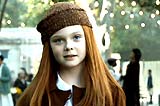
Young Daisy
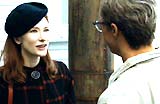
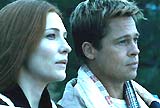
Daisy in Middle Age with Benjamin
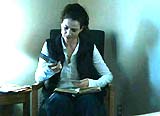
Postcards Sent to Daisy
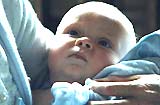
Benjamin's Death as Infant in Daisy's Arms
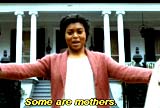
"Some are mothers"
|







































 Dill
with Fergus
Dill
with Fergus 







